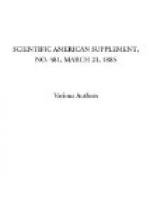There are no less than 90,000 arc lamps burning in the States every day.
The time has passed very rapidly. I have only just one or two more points to allude to. I think I ought not to conclude without referring to the more immediate things affecting travelers generally and electricians in particular. It is astounding to come across the different experiences narrated by different men who have been on the other side of the Atlantic. One charming companion that we had on board the Parisian has been interviewed, and his remarks appeared in the Pall Mall Gazette of Tuesday last, December 9th. There he gave the most pessimist view of life in the United States. He said they were a miserable race—thin, pale faced and haggard, and rushed about as though they were utterly unhappy; and the account our friend gave of what he saw in the United States evidently shows that the heat that did not affect some of us so very much must have produced upon Mr. Capper a most severe bilious attack. Well, his experiences are not mine. Throughout the whole States I received kindnesses and attentions that I can never forget. I had the pleasure of staying in the houses of most charming people. I found that whenever you met an educated American gentleman there was no distinction to be drawn between him and an English gentleman. His ways of living, his modes of thought, his amusements, his entertainments, are the same as ours; there is no difference whatever to be found. In Mr. Capper’s case I can readily imagine that he spent most of his time in the halls of hotels, and there you do see those wild fellows rushing about; they convert the hall of the hotel into a mere stock exchange, and look just as uncomfortable as our “stags” who run about Capel Court. You may just as well enter a betting-ring and come away with the impression that the members represent English society, or that that is the most refined manner in which English gentlemen enjoy themselves.
Well, gentlemen, there are just as exceptional peculiarities here as on the other side of the water. The Americans are the most charming people on this earth. When we enter their houses and come to know them, they treat us in a way that cannot be forgotten. I noticed a very great change since I was in America before. Whether it is a greater acquaintance with them or not I cannot say, but there is an absence of that which we can only express by a certain word called “cockiness.” It struck me at one time that there was a good deal of cockiness on that side of the Atlantic, that has entirely disappeared. Constant intercourse between the two countries is gradually bringing out a regular unanimity of feeling and the same mode of thought.
But there are some things in which the Americans are a little lax, especially in their history. At one of their exhibitions that I visited, for instance, there was a placard put up—
“The steed called Lightning, say the Fates,
Was tamed in the United States.
’Twas Franklin’s hand that caught
the horse;
’Twas harnessed by Professor Morse.”




